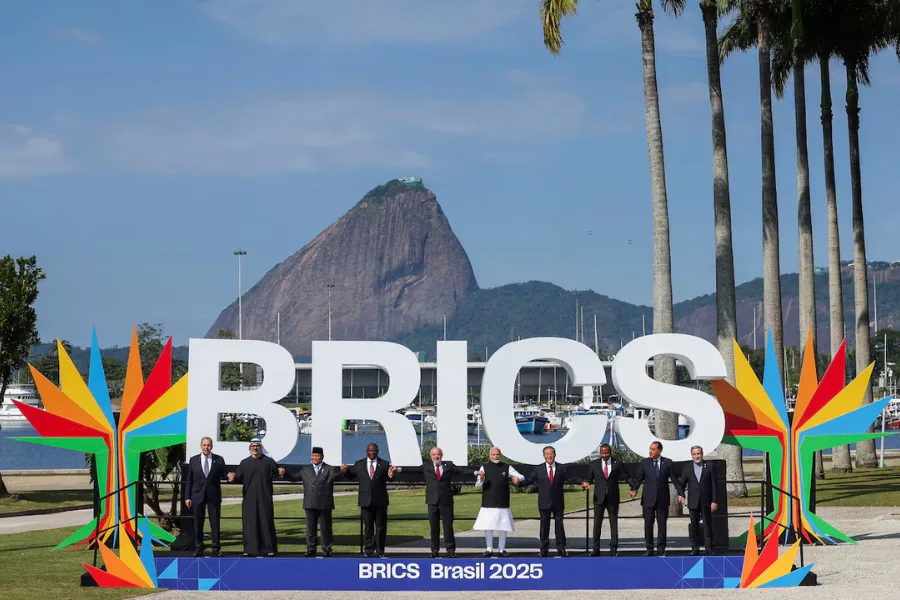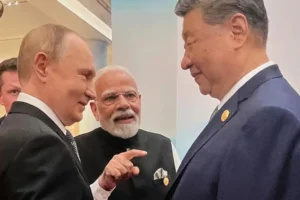
Trump BRICS Tariffs: Facing serious threats from governments around the world, in a bold articulation that triggered fresh international trade wars. US president Donald Trump said on Sunday that any nation aligning with what he called the “Anti-American mentality of BRICS” would impose an additional 10% tariff on any traded goods to the USA. The remarks came by way of Truth Social. This was as BRICS leaders met in Rio de Janeiro for a prominent summit to change the global economy.
This evolving story represents one of the richest recent updates in Global diplomacy and world commerce. The BRICS group continues to evolve in terms of scale and sustainability.
BRICS and Trump: A Timeline of Tensions
Trump has been outspoken in context to the BRICS coalition. Initially Brazil, Russia, India, China and South Africa as members; who have now included new members like Egypt, Ethiopia, Indonesia, Iran, Saudi Arabia and the UAE. Collectively, the BRICS outline more than half the world’s total population and an increasing share of world’s GDP.
The previous BRICS bloc was already viewed by the U.S. as an economic counterbalancing force. Also with the latest demands for reform in global financial institutions like the International Monetary Fund (IMF). So, with indications of de-dollarization, further tensions have been created.
Trump’s latest warning surfaces as Washington becomes increasingly nervous about BRICS’s objectives. Particularly, the group’s declared interest in developing a rival currency aimed at challenging the U.S. approach to the global de-dollarization in international markets as the principal reserve currency.
Tariffs Comes into Play
“Any country that supports BRICS and the Anti-American agenda will incur an ADDITIONAL 10% tariff.” “No exceptions,” Trump noted in the statement that follows.
He did not define what was meant by “Anti-American agenda”. The timing of the announcement – which coincided with BRICS’s criticism of U.S tariffs actions.Mmost recently U.S. military activity in Iran – suggests that Washington is tracking the broad position of BRICS.
The statement is largely consistent with Trump’s previous warnings in 2024. It was when he advised BRICS countries that any country which intended to create a separate currency to weaken the dollar would be subject to 100% tariffs.
BRICS Take Action at Rio Summit
At its convening in Brazil, BRICS leaders took an assertive position. In a collective statement by BRICS finance ministers, the organization called high tariffs a barrier to the world economy. They argued that tariffs “bring unpredictability to international economic and trade activities.”
The organization also endorsed a multipolar global order. A slogan whose use is increasing among states that want to diminish the role of western institutions, organizations, and financial systems.
Among economic matters, BRICS denounced the recent military attacks in Iran. This included attacks against nuclear facilities of Israel and the US, since June 13. The bloc’s statement declared the attacks as international law violations. A rare and coordinated denounciation that shows the impact of increasing geopolitical fracture with the West.
Mixed Shareholder Participation Demonstrates Complex Dynamics
While there were lots of global leaders at the summit, including Indian Prime Minister Narendra Modi, and the president of South Africa Cyril Ramaphosa, plenty of others were missing. For the first time, Chinese President Xi Jinping did not attend the summit in person, sending Premier Li Qiang. Russian President Vladimir Putin, who still has an outstanding arrest warrant from the International Criminal Court, attended virtually.
Nevertheless, the BRICS bandwagon appears determined to push forward with its global agenda and is not impacted by Trump’s recent threats.
A New Stage in U.S.–BRICS Relations?
If we see additional U.S. tariffs, the gap between Washington and the growing group of BRICS countries could widen. Trump’s specified approach could more than simply further tensions in trade; it could be outright escalatory, especially if countries such as Saudi Arabia, Indonesia, or even Egypt were perceived as ‘favoring’ BRICS in their engagement for reform.
As the world markets react and policymakers consider next steps after the recent news updates, what is happening at the Rio summit may be a crucial moment for future international relations. Trump’s tariffs could keep countries neutral, or they could make BRICS more attractive, speeding up the change in the changing global balance of power that the U.S. is hoping to avoid.





